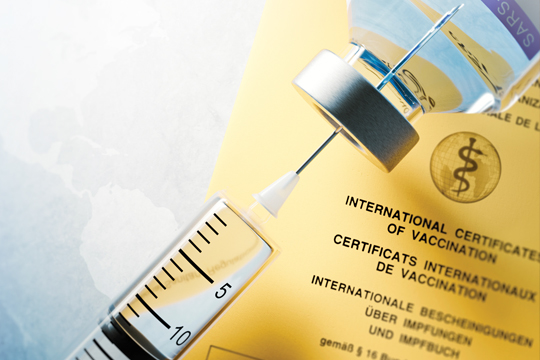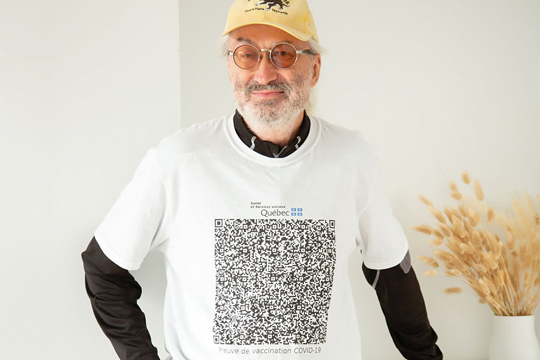
As COVID-19 lockdown measures ease, governments of all kinds are implementing vaccine passports for travel.
Loretta Pollard is getting set to make what is becoming an annual trip to Arizona. She’ll have her passport, of course, and she’ll have confirmation of a negative COVID-19 viral test she’ll take a couple of days before departure. Then there’s her new Alberta QR code for proof of vaccination, along with a printout, and, when the federal government develops its COVID-19 passport for international travel, she’ll have that, too.
After all, she reasoned recently on the Federal Retirees Facebook page, identification is routinely required to access health services, board an airplane and even to go shopping at Costco, so for her, it’s par for the course.
The retired member of the Canadian Armed Forces, who joined the National Association of Federal Retirees in 2011, says she’s not concerned about complications and seems pretty relaxed about travelling and getting a chance to play pickleball again in Arizona’s dry heat. But she’s done a lot of research and has even picked up a trick or two.
“I’m not really worried about it,” says Pollard, a resident of Medicine Hat, although she admits, “you do have to do your homework.”
Pollard sees the ever-changing rules as part and parcel of visiting another country in the era of COVID-19, but clearly there’s no longer room for spontaneity when it comes to travelling, even within our own boundaries as each province introduces restrictions and/or requirements to show proof of vaccine.
London, Ont.-based travel health specialist Chris Gall says the varied requirements imposed upon travellers by different countries are an indication that a lot of work still needs to be done to ensure smooth movement across borders.
“We all have vaccine records — there is already a known certificate of vaccination or prophylaxis that we use all the time. It’s not a new thing,” Gall, a medical doctor, says, pointing to prevention against meningitis, yellow fever and previously for polio and cholera. “It’s very natural to transition that to COVID-19.
“In my eyes, the problem is we need to have international co-operation about what we’re going to be accepting country to country,” he says. “We certainly don’t have that. The United States is one example, even from state to state.”
Gall runs travel health clinics, which are privately operated and designed to ensure Canadians remain healthy, no matter what their medical condition, when travelling abroad. Often when visiting exotic locales, travellers may require medication or vaccination against specific health risks such as high altitude or infections, including malaria, yellow fever, typhoid, hepatitis, encephalitis and even rabies and preparation for the food and water specific to certain destinations.
Right now, there’s a mishmash of requirements that changes from one country to another. There is hope that when the federal government lifts its recommendation to avoid non-essential travel outside Canada there is more consistency. Gall is hoping international consensus on requirements will soon develop.
Earlier, there was a discrepancy between the vaccinations Canadians received and what is required to travel to the many destinations stateside, for instance.
As of early November, the United States required all adult foreign nationals travelling to the United States by air to demonstrate proof of full vaccination against COVID-19 prior to boarding a U.S.-bound international flight. Travellers must also show proof of a negative COVID-19 test taken within three days of departure. U.S. Homeland Security later announced travellers crossing land borders will also be allowed to travel to the U.S. for non-essential purposes if they are fully vaccinated.
A U.S. Embassy official indicated the country will accept all vaccines endorsed by the World Health Organization from international travellers. The latest information will be posted on its website, with information also available at travel.state.gov.
Cuba is keen to get its lucrative tourism industry back into full swing, especially with its largest market — Canadians. Lessner Gomez Molina, a Toronto-based Cuban tourist board director, said the number of flights to Cuba is picking up again and the protocol for Canadian vacationers is being kept simple.
As of October, Cuba required no confirmation of a negative COVID-19 test. Instead, rapid tests are conducted upon arrival at the hotels for free. A positive test will be followed by a second and if that too is positive, the visitor is assigned to a designated hotel clinic. For the return trip home, Molina said Canadians can access the necessary COVID-19 viral test for about $37. Cuba also expected more than 90 per cent of its population would be fully vaccinated by Nov. 15 and tourists would be allowed to resume normal activity.
As provinces and countries each roll out their protocols for proof of vaccination, Nazeem Muhajarine sees the need for interoperability, allowing the systems across provinces to talk to each other and eventually the world, similar to the systems used to regulate passports.
Muhajarine, a professor of community health and epidemiology at the University of Saskatchewan who also leads part of the Coronavirus Variant Rapid Response Network, believes the key could lie in the universal adoption of QR code technology. He sees it as being secure and having potential to be admissible anywhere across the country and beyond.
“The challenge is to get every country, particularly the countries [to which] Canadians would typically travel, to co-operate with us, the Canadian government, and accept the type of vaccines that are given to Canadians” as well as the mixed combinations, he says.
“I think this requires some international and global diplomacy and discussions and arrangements.”
Muhajarine sees the need for accelerated conversations culminating in a vaccine passport that is applicable and admissible anywhere in the world.
Raywat Deonandan, associate professor at the University of Ottawa, is onside with that approach.
“There’s all kinds of magical things you can do,” he says. “The meat of it is centralized data that doesn’t require the printing out of complicated stuff and doesn’t require sharing your personal information with a stranger,” he says.
He provides the example of being asked for identification at a bar for age verification. A bouncer looking at a driver’s licence sees not just the individual’s name and age, but also the address. A QR code would provide nothing more than the name and confirmation of COVID-19 vaccinations. (A separate document, such as a driver’s licence, then provides proof of identification.) And because the QR code technology and data are managed from a central location, any updates are easily added, requiring no input from the user. The code remains the same.
Given that the world is inching toward digital identification, he believes the digital approach will become a necessity. He points to Denmark, which combined its proof-of-vaccine passport with a new digital identification system. He sees an individual’s driver’s licence, health card, social insurance card all combined on one application that can be presented through the individual’s phone.
“There is going to be some pushback obviously. But as the generation rolls on, this is going to become more and more common,” he said.
Once Jaro Franta received his proof-of-double-vaccination QR code, the Montreal-based member of Federal Retirees had it printed on a couple of T-shirts, one of which he wears here.
“It will take some time to work out the kinks here,” Deonandan says. “We have a history of showing proof of vaccination status for international travel. The only difference here is it’s for domestic use as well and, we’re in the digital realm. We’re not producing your yellow [immunization] card anymore.”
Jaro Franta fully anticipates widespread adoption of QR codes. In fact, once the Montreal-based member of Federal Retirees got his Quebec QR code, he had it printed on a couple of T-shirts. He hasn’t had them scanned yet, but the point is more about the statement it makes.
“I wanted to have something that reassures people,” he says. “The other reason is, too, that I figured that maybe when I’m going to be going overseas again.... for sure I’m going to be wearing it through all the airports in case maybe I lose that piece of paper or something happens to my smartphone.”
While some continue to struggle with the idea of being vaccinated, Muhajarine is hoping for more Frantas of the world — retirees who are loud and proud to declare they’ve received the jab. "Getting a vaccine should not be a secret," the Saskatchewan professor says. "Seniors have status in society, they should lead the conversation,” he says.
Travel guidance from the federal government is available at travel.gc.ca.


